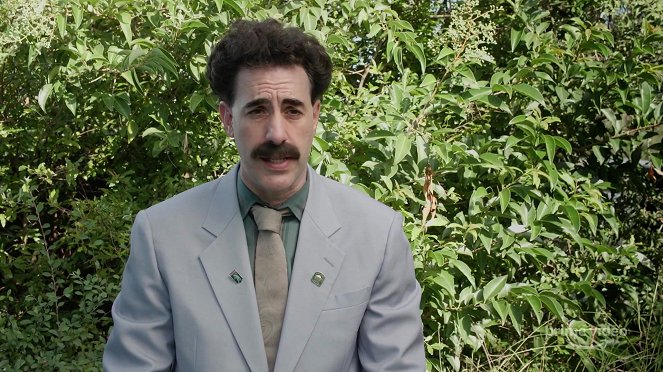Director:
Jason WolinerCámara:
Luke GeissbühlerMúsica:
Erran Baron CohenReparto:
Sacha Baron Cohen, Maria Bakalova, Rudy Giuliani, Tom Hanks, Jason Woliner, Rita Wilson, Mike Pence, Stephen Stanton, Anis DorofteiStreaming (1)
Reseñas (10)
El inicio y el final en Kazajistán son geniales, pero todo lo que hay entre medias es una miseria que toca temas sociales a fuego lento pero a través de una construcción argumental poco imaginativa y un humor tonto y sin gracia. Y el efecto de «cámara oculta», que hizo maravilloso el primer episodio, ni siquiera se ha intentado aquí.
()
I enjoyed the first Borat back in the day. It was my first encounter with Sacha Baron Cohen, and I roared with laughter at it because his ability to hide clever satire behind extremely vulgar jokes simply amused me. I'm all the more fascinated that in Borat 2 this is not only practically non-existent, but downright absent. Instead of more caustic savagery, Cohen made a pretty OK, if not actually very interesting, comedy about a Central Asian douchebag bonding with his daughter. It's not particularly interesting because Borat as such was never really a classic character and now Cohen would like me to approach him that way as a viewer. Only that I can't when there aren't even the foundations for something that would like to be a touching comedy and is largely a normal feature film. And then there are the Borat scenes. Michael Pence must have been very upset, and Robert Giuliani and his PR department must be having a hard time sleeping right now, but otherwise? Borat tries to shock, trick or fool a candy maker, a phone salesman, a printer and fax machine salesman and a few well-meaning (if a bit dim) rednecks, and they all more or less don't care. And me too, actually. As a Borat comedy, it's practically all over the place, and if I accept the idea that Cohen actually wanted to make a slightly different film with a slightly different theme, I have to wonder why the hell he did it with Borat in to begin with.
()
In some ways, Borat has a much harder time than he did 14 years ago, because what was a marginal excess back then is normcore today. But Sasha can get tough, and even though he recycles essential jokes, they are still great and they still work even in partial improvisation. There are a few instant classics (invasion of the Republican congress, a menstrual dance, a synagogue, a concert and, above all, Rudi's incredible anal sex), and the introduction and conclusion have a wonderful cadence, and Maria Bakalova is a great side-chick, although the finished family storyline is definitely a weakness. For me, Borat remains one of the few completely free forms of satirical commentary on the present, in which the Kazakh redneck, along with a collection of highly misogynistic, anti-Semitic and racist views, acts as a gentle caress of the skin. The world has turned to shit, and people like Cohen protect what is left of common sense.
()
Borat isn't exactly a comedy where you laugh from start to finish, but Sacha Baron Cohen breaks boundaries and does what probably no one else would dare to do, and for that alone I'll give it a generous rating. Towards the end the film ran out of breath, but a couple of scenes were legendary (the toilet scene with the baby, or the current covid-19 issue). I also liked the final twist, which was quite unexpected. Story****, Action>No, Humor****, Violence>No, Entertainment****, Music***, Visual***, Atmosphere**, Suspense*. 7/10.
()
The second Borat is an overblown PR bubble as well as a movie that was hastily slapped together in an effort to coast on the moods of pre-election America. As Sacha Baron Cohen himself admits, he could not go back to the same well a second time simply because people already knew the Borat character. Therefore, the second film is built to a far lesser extent on confrontations with unsuspecting people who reveal themselves vis-à-vis the caricature. It rather relies mainly on a screenplay with a traditional narrative structure and the clichéd dramatic arc of the main characters, which only becomes overwrought through repetitive jokes. Paradoxically, the second Borat gives the impression of being a rapidly fermenting copy of Cohen’s chilling masterclass in Who Is America?. Though he again wagers on ratcheting up the awkwardness, in most situations, unfortunately, confrontational provocation remains only wishful thinking. It is obvious that Cohen has to try really hard to draw something usable out of the situations, but that does not prevent the PR department from spinning a carousel of spectacular claims (the apex of futility is the attempt at fomenting a scandal with Giuliani). The Borat character and the attempt to bring unnecessary dramatic consistency to the film repeatedly prove to be its main hindrances. Cohen’s need to maintain a trace of the Kazakh dolt in his new prankish alter egos by means of an accent undermines a number of scenes by limiting the potential for provocation. If Borat’s first look into American culture brought forth a lot of frightening and disturbing revelations about the American character, the return of the self-proclaimed reporter shows only a country in a state of lethargy, where even the greatest provocation will be met only with silence and raised eyebrows. The clown lost his power derived from placing a mirror in front of the country, because during his absence, America itself chose a much grimmer clown as its president and the essence within America, once previously revealed with shame, was transformed from the grotesque dark side into the norm of social discourse. It is also appropriate to note that infotainment also underwent a change during that time and that confrontation leading to throwing off façades is now a common or rather frequently updated part of journalistic comedy programmes such as The Daily Show and The Opposition with Jordan Klepper. However, that does not mean Cohen’s style of ultra-awkward confrontations has lost its effectiveness, as was confirmed by the outstanding Who Is America? project. Borat itself, or rather the transformation of its purpose, is what stands in the way. The first film occupied the plane of confrontational malice with carefully selected targets. The second film becomes a desperate slave of the narrative line, which has the consequence of preserving the dysfunctional and obviously unsuccessful pranks (the entire sequence with a fax machine, the uber driver, etc.), which previously would have wound up on the cutting-room floor or the film’s creators would have tried to stage again with other victims, if they hadn’t had a release deadline before the American elections. Cohen’s activistic agitation paradoxically drags the film to the bottom. It also brings into it an element of unnaturalness and staging, which is manifested in the well-meaning sequences of the touching humanisation of Borat and his daughter (babysitter and synagogue). The general proclamation that Borat’s return offers necessary relief for these times, thus (in addition to accepting pre-formulated claims) rather reflects an even more desperate state of the culture and society than Borat can uncover. There are flashes of that in the film and something could happen, but that would require completely reworking the concept and, mainly, rejection of the predetermined storyline. We thus go back to the beginning for confirmation that, unlike Cohen’s aforementioned series project, this film is not about America, but only about Borat, who has gone from being a functional catalyst to a dysfunctional character.
()
(menos)
(más)
The candid camera only works in the biggest Hicksvilles and with Giuliani. Borat is still entertaining, but the scenes with dumb Americans are no longer enough, so he adds a deeper relationship with his daughter to this road movie. A decent sequel that works better in Kazakhstan than in America.
()
The first half is great: brisk, funny, politically incorrect enough, and original, but then comes the unusually stagnant filler, with the characters just moving around and boring emancipation bullshit that only someone as bold and original as Cohen could get away with. Things get back on track in the last ten minutes, which prove that this film is at its best when it relies on individual clips and gags, which isn’t that good for a feature film threading political and social insight. 65%
()
Definitivamente aprecio la media docena de chistes y escenas realmente divertidas e imaginativas, pero por lo demás es muy floja, especialmente si la comparamos con la primera gran Borat. Desafortunadamente, los enfrentamientos con los estadounidenses "desprevenidos" (que sorprendentemente esta vez se resignan y disfrutan de todo) son flojos, en algunos momentos da la impresión de una puesta en escena artificial, y especialmente la necesidad desesperada de meterlos en una trama dirigida, convulsiva y desafortunadamente disfuncional por debajo del promedio sobre la relación entre padre e hija. Mientras Cohen provoque con disfraces extraños, seguirá funcionando, pero tan pronto como se produzca la ficción, o si hay alguien más en la pantalla, la película se cae inmediatamente. Sobre la sátira superior solo se puede hablar de manera esporádica, principalmente es una comedia relativamente estándar con un humor limitado y muchos puntos ciegos.
()
"I found a new book which only tells truth. It's called Facebook." Despite its cult status, the first Borat didn't quite get me as excited as many viewers, but I still saw it as an aptly ironic comedy that didn't mince words on any front. The sequel appealed to me in much the same way, though its atmosphere shifted more into the waters of the drama-family genre, but still with an unmistakable ironic-critical tone. Sacha Baron Cohen as Borat is once again insane, making fun of Trump, the coronavirus, Americans, Jews, women, feminists and many others, which he does brilliantly in places, and a little less so in others. Borat 2 is a textbook example of a film for which I can understand any rating!
()
Las EE. UU. de Trump merecen más que suficiente la continuación de Borat, así que me divertí bastante y me reí varias veces en voz alta. Definitivamente, Maria Bakalova destacará en el papel principal femenino, secundando hábilmente y con humor a Cohen. Veremos qué EE. UU. nos muestra Borat en el año 2030...
()

